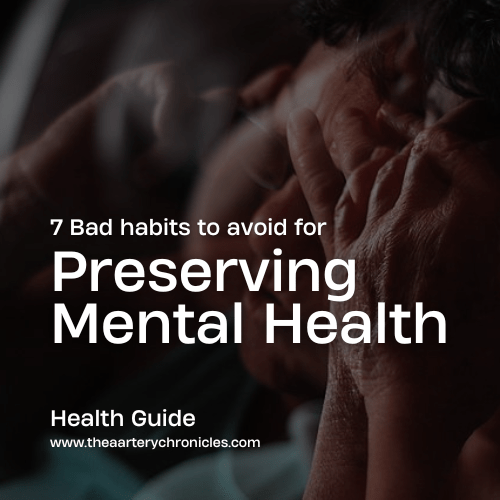

7 Bad Habits to Avoid for Preserving Mental Health
Mental health is a critical aspect of well-being, influencing how we think, feel, and behave. Certain habits can detrimentally impact mental health, exacerbating stress, anxiety, and depression. Recognizing and avoiding these behaviours is essential for maintaining cognitive health and enhancing the quality of life. Here are seven habits to be mindful of and avoid to protect mental well-being.
Procrastination
Chronic procrastination can lead to heightened stress and anxiety as tasks pile up, creating a sense of overwhelm. This habit can contribute to a cycle of negative emotions, affecting mental clarity and self-efficacy. Clinically, procrastination is often linked with higher levels of cortisol, the stress hormone, which can have a range of negative physiological and psychological effects.
Neglecting Physical Health
Physical health is deeply intertwined with mental health. A poor diet, lack of regular exercise, and inadequate sleep can lead to physical illnesses that strain mental health. Studies have shown that regular physical activity releases endorphins, which act as natural mood lifters. Conversely, poor physical health can lead to increased stress, depression, and anxiety.
Overuse of Social Media
Excessive use of social media has been associated with feelings of inadequacy, loneliness, and depression. The constant comparison with others’ curated lives can erode self-esteem. Clinically, it has been observed that heavy social media use can lead to reduced face-to-face interactions and sleep disturbances, further impacting mental health negatively.
Avoiding Social Interaction
Social isolation can lead to loneliness and depression, significantly impacting mental health. Human beings are inherently social creatures, and meaningful social interactions are essential for emotional support and mental well-being. Lack of social engagement can lead to increased feelings of loneliness and a higher risk of mental health disorders.
Ignoring Stress
Chronic stress that is not addressed can lead to severe mental health issues such as anxiety disorders and depression. Clinically, unmanaged stress is known to contribute to the development of various psychological conditions and can exacerbate existing mental health problems. Effective stress management techniques, such as mindfulness and cognitive-behavioral strategies, are essential.
Negative Self-Talk
Persistent self-criticism can erode self-esteem and contribute to mental health disorders like depression and anxiety. Negative self-talk creates a harmful internal dialogue that can lead to feelings of worthlessness and hopelessness. Cognitive-behavioral therapy (CBT) techniques can be effective in transforming negative thought patterns into more positive and constructive ones.
Substance Abuse
Using drugs or alcohol as a coping mechanism can lead to substance dependence and exacerbate mental health issues. Substance abuse often masks underlying mental health problems, delaying appropriate treatment and potentially leading to more severe mental health disorders. Clinically, substance abuse is associated with a range of mental health conditions, including anxiety, depression, and psychosis.
Avoiding these detrimental habits is crucial for preserving mental health and enhancing overall well-being. By adopting healthier behaviors, such as regular physical activity, effective stress management, and fostering positive social interactions, individuals can reduce stress, improve emotional resilience, and cultivate a more positive outlook on life. Clinically, these strategies are supported by evidence-based practices that promote mental health and prevent the development or exacerbation of mental health disorders.









